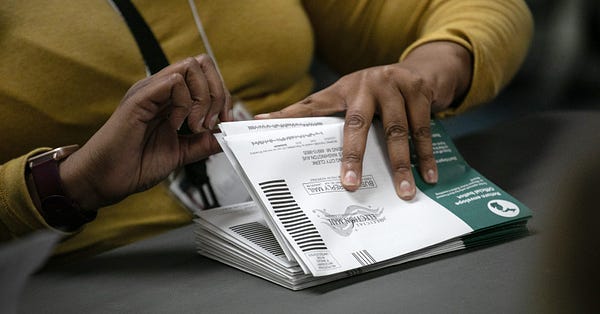Welcome to The Experiment, where we’re beginning to think that Ted Cruz and Ken Paxton may not be completely on the up and up. Jack Hughes finds lessons for Joe Biden in how Peyton Manning went out on top in “Throwing Lame Ducks,” and Sonia Van Meter loses and regains faith in the Discovery series in the span of a single episode in “Execute.”
And as always, we remember who we lost (this CIA analyst) and recommend things to do (baking pastitsio), read (Dan Zak on Krakens), watch (season 4 of The Crown), and listen to (You’re Wrong About on Princess Diana).
But first, did I ever tell you the story about my Uncle Buddy and Princess Margaret?
That’s him on the right, the blindingly handsome man sitting next to Lady Rothermere at party on the Island of Mustique in 1976. Robert Mapplethorpe took that and one other photograph of my then mid-twenties uncle, shirtless, wearing only a lamé swimsuit and a smile so dazzling and charming you could forgive the press for leaping to a peculiar conclusion, for this was no ordinary party with men in metallic bikinis and fancy women with plumage sprouting from their head wraps. This was one of Princess Margaret’s infamous Caribbean bacchanals portrayed as exercises in royal dissolution in Netflix’s The Crown. At the time, of course, it seemed like glamorous great fun, and when the pictures got out, the tabloids back home in London supposed that the dashing American might be Princess Margaret’s latest scandal.
At least that’s what he told us when we saw him shortly thereafter. Scott Kalani Durdan was his name, the first after his father and the middle for our native Hawaiian heritage. He went by Kalani, but I called him Uncle Buddy. He told the anecdote about being a princess’ rumored paramour the same way he told all his stories. Oh, what great fun! But that’s where the story stopped, frustrating my elementary school brain trained to balance the “boy + girl” equation with “love + marriage.”
“Uncle Buddy! You should marry her!” I said.
My memory sees a kind smile towards his simple nephew. He shook off my entreaty for the childlike enthusiasm it was. But what interests me now is that his sisters and my grandparents also seemed content to let the story end there. Oh, what great fun!
My grandmother bought a commemorative tea set when Prince Charles married Lady Diana, an event I loathed because the plodding, pointless ceremonies dominated the television. Later, when Di became a media phenomenon, I didn’t regard her as a real person. She seemed more of a pointless appendage to an un-American construct, the protagonist of a trashy reality show. All of which is prelude to share my surprise that I have completely devoured The Crown, which is what brought back that happy memory of the time the silly reporters thought my uncle was dating a princess.
By now, of course, I know why Uncle Buddy and Princess Margaret never would have worked out. Sadly, he’s no longer around, so I can’t ask him about it. When he got sick, the family all found out. Some of them, I now know, knew all along and kept his secret that he was gay. One of them kept it to protect him. One kept it to protect herself. As a child, I thought his life was a fairy tale. As I move with alarming acceleration through middle age, I’m realizing how true that was.

There’s a scene in the latest season of The Crown where Camilla Parker Bowles, played by Emerald Fennell, realizes that the public will hate her and Prince Charles if he divorces Diana for her. They are living a fairy tale, she explains, and Diana’s the princess.
“To be the protagonist of a fairy tale, you must first be wronged. A victim,” she tells him. “Which, if we were to become public, we would make her. In the narrative laws of fairy tales versus reality, the fairy tale always prevails.”
This feels right until your brain starts asking why people don’t listen to reason. The truth is, after all, true. That should matter, but in fact the truth has some inherent structural defects.
“The two biggest problems with the truth is that first the truth is often unpleasant and painful to know … and it’s complicated,” said Sapiens author and historian Yuval Noah Harari on Bill Gates and Rashida Jones Ask Big Questions. He was explaining why people believe fairy tales about the novel coronavirus, but he might as well have been talking about why millions were invested in the loveless marriage of Charles and Di or our family’s faith in the lifelong fiction that my Uncle Buddy was a heterosexual. I mean, people, he was wearing a tiny lamé swimming suit in a Robert Mapplethorpe photograph.
Believing in a fairy tale doesn’t mean someone is lying to you. A fairy tale is a lie we tell ourselves.
“If you want to lie, you need to convince people,” added Harari. “And the best way to convince people is to believe the lie yourself. It’s not easy to know the difference between deceiving others and deceiving yourself. Very often if people start out by lying somewhere along the way, they start to believe their own lies.”
It’s an article of faith that George W. Bush lied our way into Iraq, but does it mean the same thing if he believed the lies? In my friend Robert Draper’s excellent new book, To Start a War: How the Bush Administration Took America into Iraq, Donald Rumsfeld, Paul Wolfowitz, et al believed in the fairy tale about WMDs so ardently that they could not absorb facts and perspective to the contrary. It is still horsespit if they sincerely believed their own bullpucky?
In pre-Civil War Georgia, medical students were only allowed to operate on Black people, who at that time could not give their consent, and medical schools would only use Black cadavers in anatomy class, a market need grave robbers were only too happy to fill. Word got back to the enslaved that dead bodies were disappearing from graves and live ones were being cut up, so enslavers would wear white sheets and chant “We want men! We want men!” in the nighttime to scare them from escaping lest the Night Doctors got them. Some speculate that the KKK took their uniforms from the fairy tale of the Night Doctors to terrorize the population. So ingrained was the Night Doctor fairy tale into the Southern Black psyche that people brought it up more than a century later after the Tuskegee Syphilis Experiment. Is it still a fairy tale if it keeps happening?
And sometimes, if you get enough people to believe in a fairy tale, it really does come true. In the Washington Post, Yale historian Beverly Gage argued that the undertow of victimhood turned McCarthyism into the conservative movement.
McCarthy died of complications from alcoholism in 1957, cast out of the Republican inner circle but still beloved by millions of far-right admirers. Over the next few decades, the story of his role in inspiring the early conservative movement began to disappear, as other politicians — Barry Goldwater, then Ronald Reagan — rose to the fore as more palatable standard-bearers. On the right, though, the legend of his victimization lived on. As recently as 2003, conservative provocateur Ann Coulter (an on-again, off-again Trump ally) published the book “Treason,” arguing that McCarthy was right and his critics were not only wrong but, as the title suggests, traitorous. Trump himself was schooled at the knee of Roy Cohn, McCarthy’s infamous committee counsel, who long insisted that his good friend Joe had been the victim of an outrageous elite conspiracy.
McCarthy fell, and conservatism rose with its fairy tale of welfare queens and ending welfare as we know it, of superpredators and trickle down economics.
Which brings us to 2020. For decades, people used this year as a metaphor for seeing over the horizon. The names of futuristic civic projects launched in the ‘90s followed the same formula, CITY NAME 2020, giving the impression that in that far-off year we’ll have it all figured out. But every day since March 11 has been Blursday, Marchtober 73rd. The most 2020 thing ever is that in the year that shares its name with the measure of perfect vision, we’re being asked to believe a fairy tale in which people were not in rooms where they were, in which people who voted were dead, and some of it happened in Michigan in a county that does exist.
Some recognized Donald Trump right away. Jerrold M. Post, a former CIA psychological profiler, saw Trump for the threat he posed. “The dangerous, destructive charismatic leader polarizes and identifies an outside enemy and pulls his followers together by manipulating their common feelings of victimization,” Post said in a December 2019 interview.
For all the talk of Krakens and fear of coups, Trump’s exiting the stage, but like McCarthy before him he’s leaving a cult of victimhood behind. “We’re all victims,” he said, trying to get out the vote in Georgia. “Everybody here. All these thousands of people here tonight. They’re all victims. Everyone one of you.”
The fairy tale has taken root, and about as many Americans think a federal mask mandate would violate their civil liberties as believe Trump won an election he lost by 8 million votes. As with McCarthy, Republicans are terrified of Trump’s eye landing on them, so they go along with it. More than half of congressional Republicans signed an amicus brief supporting an effort by most Republican state attorneys general asking the Supreme Court to overturn the election.


It’s possible the United States of America, “conceived in Liberty, and dedicated to the proposition that all men are created equal,” is our founding fairy tale, considering how many asterisks are needed for “all men,” much less “equal.” Everyone remembers the stirring words of self-evident truths, that’s just a prelude to the “history of repeated injuries and usurpations, all having in direct object the establishment of an absolute Tyranny.” They were all victims. We weren’t conceived in liberty as much as victimhood.
What are we to do about Trumpism? I take some comfort in The Truth Coming Out of the Well, an 1896 painting by Jean-Léon Gérôme. There are a lot of theories about the meaning behind this work, many of which sound persuasive but only one of which I like because it’s a helluva story.
One day the Truth and the Lie meet, and the Lie suggests that they enjoy the lovely weather and take a walk outside. Eventually they find themselves at a well where the Lie suggests they take a bath, so they disrobe and jump in.
All at once, the Lie gets out, puts on the Truth’s clothes and skedaddles. The Truth is outraged, climbs out of the well, and races after the Lie to get her clothes back. But the World turns away from the naked Truth. Her naked presence outrages and scandalizes the World. Ashamed, the Truth goes back to the well and hides in the water. And ever since, the Lie has kept on traveling everywhere dressed as the Truth, which suits the World just fine, because as it turns out no one is really that eager to see the naked Truth.
Why do I take comfort in this painting? The Truth Coming Out of the Well is now a totem of feminist rage. Look at her face. She’s mad as hell and apparently all out of ducks when it comes to our fairy tales. Or maybe that’s just the story I’m telling myself. Maybe the truth is we prefer to tell ourselves fairy tales.
Throwing Lame Ducks
by Jack Hughes
Going out on top, whether after winning a Super Bowl or the White House, requires a tricky bit of timing, writes Jack Hughes. The decision not to run for re-election is the smart one, but when to announce it is the trick. That’s why Hughes says Biden can take a lesson from Peyton Manning. Hint: Don’t yell “Omaha!”
S3 E 8: Execute?
by Sonia Van Meter
This week Sonia Van Meter all but loses patience with a Star Trek that was looking more and more like Star Wars. Did it gather itself and finish strong? “It’s as though the writers suddenly remembered to open the nozzle on the Star Trek juice firehose, she writes. Find out why she ended up “blubbering like a toddler.”
Who we’ve lost
This CIA analyst who labeled Trump “dangerous” - read this one to the end, and then get busy living
This Kansas dad
This poll worker
This Texas judicial candidate
How we’re getting through this
Baking patitsio
Eating scotch eggs
Tricking killer whales
Roasting buttermilk-brined chickens
What I’m reading
Monica Hesse: “‘Take off your mask’: Boorish customers have found a way to make sexual harassment even more of a hazard” - My dudes, this is very undude.
As a server, Sandy Tran was used to unwanted comments on her appearance, but the coronavirus precautions enforced by her Dallas restaurant now required full-time face coverage — a literal barrier between Tran and creepy customers.
Then she heard the first iteration of what would become a refrain:
“Take off your mask,” the diner instructed her while she took his order one afternoon. “I want to see your beautiful smile.”
Ryan Holiday: “This Is the Real Virus to Fear” - Have to guard your head as well as your body.
I found out a few days ago that a friend caught the virus.
I was worried. I felt sorry for them. I was also frustrated. Because it wasn’t COVID they had been infected with, but a different virus related to it: the virus of conspiracy.
Its symptoms presented almost immediately. Along with delusions were the corresponding symptoms of callousness and selfishness and deliberate ignorance.
Meghan, The Duchess of Sussex: “The Losses We Share” - Worth a read about sharing our losses.
“Are you OK?” a journalist asked me. I answered him honestly, not knowing that what I said would resonate with so many — new moms and older ones, and anyone who had, in their own way, been silently suffering.
Alyssa Rosenberg: “‘Mank’ punctures Hollywood’s most sacred myth” - The confusion of making an impression with making real change spoke to me.
As a period movie that is partly about mistaking a work of art for an act of politics, “Mank” feels like an excellent companion to “Hail, Caesar!” whose plot is driven by people who mistake movie high jinks for meaningful political tactics.
Luke Schleusener: “Let the Pride Flag Fly: Secretary Esper ’s clever rule that bans the Confederate flag needs a fix. Here’s how he can bring real equality to the Defense Department.” - TFW you ask your friend if they can retroactively give troops kicked out of the forces for being gay honorable discharges, and he says, “Yeah, remember I wrote about that?”
[T]he current policy still places a heavy burden on veterans to appeal their case individually, requiring often expensive legal representation and access to records that may no longer exist. Esper could direct the service Boards for the Correction of Military Records to review records, identify minority veterans who received bad paper discharges, use Boards’ ability to wave statutes of limitations “in the interest of justice.” Then, under 10 U.S.C. § 1552(b), the secretary could request a correction to military records “on behalf of members or former members of the armed forces who were similarly harmed by the same errors or injustice.”
Sam Stein: “The Hottest Campaign Ads on Twitter Didn’t Really Work: Study” - That we’re still debating the purpose of the Lincoln Park ads, much less the efficacy, tells me something.
According to Nick Ahamed, Priorities’ analytics director, the correlation of Twitter metrics—likes and retweets—and persuasion was -0.3, “meaning that the better the ad did on Twitter, the less it persuaded battleground state voters.” The most viral of the Lincoln Project’s ads—a spot called Bounty, which was RTed 116,000 times and liked more than 210,000 times—turned out to be the least persuasive of those Priorities tested.
Dan Zak: “A Kraken is loose in America” - I swear I thought of my piece before I read his.
Our Kraken, our selves. America was founded on certain myths and beliefs relating to freedom, individualism and righteous rebellion. Now these myths and beliefsare encircling our necks. Over the past month, as we’ve moved into a third wave of coronavirus and toward a Joe Biden presidency, some Americans have lived in an alternate reality, a Kraken reality.
What I’m watching
Folks, if you haven’t watched The Crown, I envy the enjoyment that awaits you. This show is so well done it made me care about vestigial royalty.
What I’m listening to
Ryan Holiday has some great conversations on The Daily Stoic. Two of note were with George Raveling on the surprising moral obligation to read and Billy Bush on redemption.
Billboard did a mini documentary about the masked country music star, Orville Peck.
But people, when I say The Crown made me care about the House of Windsor, I went all in. You’re Wrong About, a terrific podcast about the real story behind the myths we all think we know, has an actually no-kidding worth-it five-part series about Princess Diana.
What do you think of today's email? I'd love to hear your thoughts, questions and feedback. I might even put ‘em in the newsletter if I don’t steal it outright.
Enjoying this newsletter? Forward to a friend! They can sign up here. Unless of course you were forwarded this email, in which case you should…
Thanks to Noom I am down to my college weight, and haven’t had to cut out any foods. I hit my goal weight before Memorial Day and have stayed within a few pounds either way ever since. This is easy. Noom is an app that uses psychology, calorie counting, and measuring activity to change your behavior and the way you think about food. I’m stronger and healthier than I’ve been in years. Click on the blue box to get 20% off. Seriously, this works.
Headspace is a meditation app. I’ve used it for a couple years and am absolutely shocked at how much it’s taught me about managing my inner life. Try it free for a couple weeks. Don’t worry if you’ve never done it before. They talk you through it.
I now offer personal career coaching sessions through Need Hop.
If this newsletter is of some value to you, consider donating. Honestly, I’m not doing this for the money. I’m writing this newsletter for myself, and for you. And a lot of you are contributing with letters and by suggesting articles for me to post. But some of you have asked for a way to donate money, so I’m posting my Venmo and PayPal information here. I promise to waste every cent you give me on having fun, because writing this newsletter for you is some of the most fun I’ve had. Venmo me at @Jason-Stanford-1, or use this PayPal link.
Forget the Alamo: The Rise and Fall of the American Myth by Bryan Burrough, Chris Tomlinson, and myself comes out June 8 from Penguin Random House. There is no better way to support this book than to pre-order a copy. You’re going to love reading what really happened at the Alamo, why the heroic myth was created, and the real story behind the headlines about how we’re all still fighting about it today.













